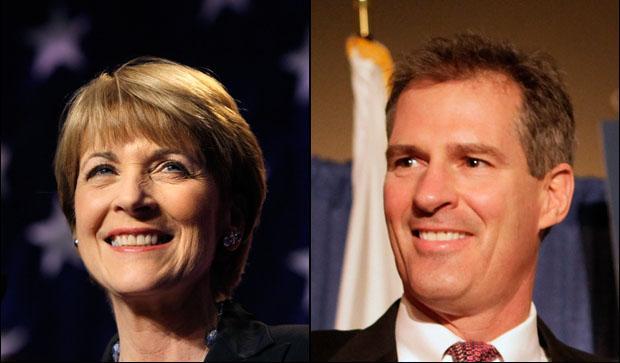Advertisement
Coakley, Brown To Face Off For U.S. Senate Seat
Resume
Martha Coakley, who grew up in North Adams, came one step closer to Washington when she secured the Democratic nomination for Massachusetts' open U.S. Senate seat on Tuesday night. In her victory speech, she told supporters about a present given to her by a young man in a wheelchair at a rally in South Hadley a week earlier.
"I didn't open it until Sunday morning," Coakley said. "When I did, I found it was a mug and on that mug was the text from Lewis Carroll's "The Looking Glass." And it went like this:
"There's no use in trying," said Alice. "One can't believe impossible things."
"I dare say you haven't had much practice," said the Queen. "When I was your age, I always did it for half an hour a day. Why sometimes, I believed as many as six impossible things before breakfast."
Coakley gave credit to her field organization and the labor unions who worked to get out the vote for her, and twice thanked Emily's List, a political action committee that raises money for women candidates who support legalized abortion. Women fund-raisers rallied early to her campaign.
"This is one small step for women," Coakley said to applause. But, she added, the fact that she could become the first woman elected to the U.S. Senate from Massachusetts will not be theme of her campaign.
"No. My theme is that I've been a very effective leader," Coakley said. "I'll bring a different kind of leadership to Washington, and I will get good results."
Coakley said she spoke to Vicki, Patrick and Ted Kennedy, Jr., the widow and sons of the late Sen. Edward M. Kennedy on Tuesday night. She later said that she does not know if any of the Kennedys will campaign for her.
Coakley won 47 percent of the vote. Mike Capuano came in a distant second, with 28 percent. She won all over the state.
"I just believe in her," said Debbie Payne, of Braintree. "I trust her."
"I loved her for years," gushed Mary Ellen Page, of Brookline. "I think that she's done awesome work. Think she's incredibly smart and talented."
Capuano won the four cities in his district: Boston, Cambridge, Somerville and Chelsea. But with the exception of the Pioneer Valley and parts of the Berkshires, he never broke through in the rest of the state. In his concession speech, he provided the best analysis of Coakley's victory in this short three-month race that anyone offered Tuesday night.
"We built an organization across the state. We couldn't catch up," he said. "Simply put, others were ahead of us. We did our best to narrow that gap and to move forward, but in the final analysis, name recognition matters. The attorney general was a pretty good candidate. She didn't make any slip-ups. And we just couldn't narrow the gap."
Alan Khazei came in third with 13 percent of the vote. He carried just one town: Alford, in the Berkshires.
"You all came into this campaign knowing that the climb was steep, the calendar short, the odds long," he said.
Khazei's supporters felt they ran a good campaign, and expect him to run again. He said the poverty he witnessed in Massachusetts during this campaign has spurred him to devote more time to anti-poverty efforts starting today.
Steve Pagliuca came in fourth with 12 percent of the vote. He didn't carry a single town.
"We really gotta reverse this problem of unemployment, and I'll work with the nominee to get that done," Pagliuca said.
Republicans have not sent a senator to Washington since 1972. Scott Brown laid out how he sees the choice now before Massachusetts voters.
"We can send another partisan placeholder to the United States Senate, or we can try something new: We can elect an independent voice for all of Massachusetts," Brown said to cheers. "And that's the United States senator I promise to be."
After his victory speech, Brown laid out some more of the differences he sees between himself and Coakley. "She wants the tax cuts to expire, plus an across-the-board tax increase for the businesses and citizens of Massachusetts," he said.
Brown adviser Eric Fehrnstrom predicts that enough voters are motivated to restrain spending in Washington that, this time, Massachusetts could send a Republican to the Senate.
"We think there are people out there who will walk through a Northeast gale and a snowstorm in January to vote for him," Fehrnstrom said.
But Brown faces perhaps an even tougher challenge than Coakley's primary opponents. The general election race is even shorter than the primary campaign — just a month to go until the election in January, with the holidays in between.
WBUR's Steve Brown and Curt Nickisch contributed to this report.
This program aired on December 9, 2009.
